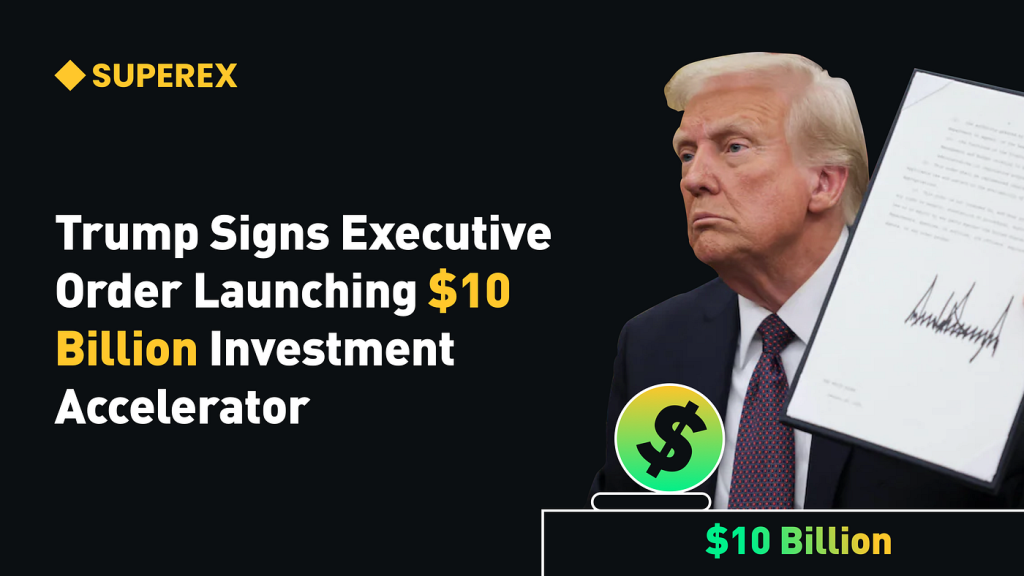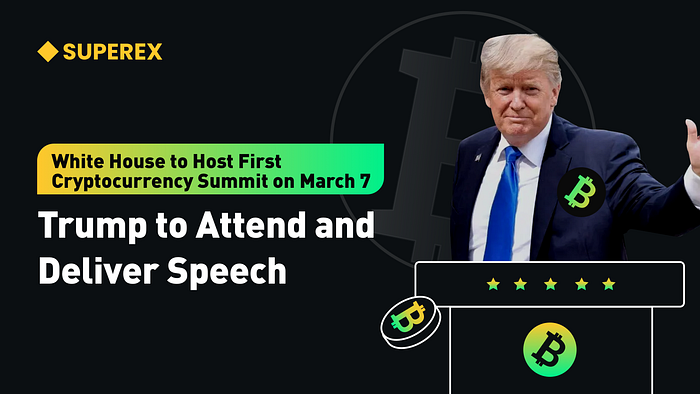Trump Signs Executive Order to Launch $1 Billion Investment Accelerator

#Trump #Crypto # America
On March 31, the White House announced that President Donald Trump has signed an executive order to establish a new investment office under the Department of Commerce, named the America Investment Accelerator. The initiative is expected to deploy and fast-track over $1 billion in U.S. investments. Its responsibilities include reducing regulatory burdens, expediting approvals, and coordinating responses across federal agencies.
The office is expected to take the following actions:
- Reduce regulatory burdens
- Accelerate the permitting process
- Coordinate responses from multiple federal agencies to investor concerns
- Expand access to national resources
- Promote collaboration with national laboratories
- Work closely with all 50 state governments and their economic development organizations
In addition, President Trump directed the America Investment Accelerator to oversee the CHIPS and Science Act program office and to negotiate a better CHIPS Act agreement than the previous administration.
The head of the office stated:“The Investment Accelerator will oversee the CHIPS Act program office, ensure taxpayers get the return they deserve, and negotiate a much better CHIPS deal than the last administration.”
- Click to register SuperEx
- Click to download the SuperEx APP
- Click to enter SuperEx CMC
- Click to enter SuperEx DAO Academy — Space

Breaking Bureaucracy: The Era of “Cut in line” Corporate Investment Begins
For years, American businesses investing in key sectors such as infrastructure, manufacturing, and energy have faced lengthy approval processes and complex regulatory requirements. The Trump administration’s creation of the America Investment Accelerator is aimed at breaking through this bureaucratic inertia, improving investment efficiency, and enabling companies to essentially “cut in line” to enter the market — minimizing lost opportunities caused by approval delays.
The new agency plans to establish a “fast-track approval channel” to reduce unnecessary paperwork, particularly in strategic sectors such as semiconductors, artificial intelligence, and renewable energy, allowing investors to move into production more quickly. The office will also collaborate with state governments and local economic development organizations to ensure smoother capital flow.
However, whether this “fast-track” model will impact fair market competition remains to be seen. While the government promises to prioritize high-value projects, concerns may arise over whether certain companies or industries might receive disproportionate favoritism. In addition, deregulation could raise concerns around environmental protection, safety standards, and broader social impacts.
Capital Euphoria vs. Rising Concerns: The Double-Edged Sword of Deregulation
In the eyes of capital markets, regulatory easing often signals more investment opportunities, faster capital turnover, and higher returns. Especially in high-growth sectors like semiconductors, clean energy, and the digital economy, reducing bureaucratic obstacles could greatly boost investment appeal — potentially turning the U.S. into a global magnet for capital inflows.
Yet this deregulation also comes with inherent risks. Excessive relaxation may undermine standards for corporate governance and market stability, and open the door for speculative capital to infiltrate, potentially fueling financial bubbles or industry imbalances. Moreover, over-simplified approval processes could lead to the neglect of critical issues like environmental protection and safety, resulting in long-term economic and societal consequences.
Under the Trump administration’s investment acceleration initiative, the challenge for future policymakers will lie in striking the right balance between capital expansion and regulatory compliance — a task that will require careful judgment and ongoing oversight.
Global Supply Chain Disruption and Its Impact on the Crypto Industry
The establishment of the America Investment Accelerator will not only impact traditional industries but also have far-reaching implications for the cryptocurrency sector. With deregulation and accelerated capital flow, the U.S. could become a new hotspot for crypto investment — particularly in terms of institutional capital inflow and blockchain infrastructure development.
On one hand, loosened policies may attract more crypto exchanges, mining companies, and Web3 firms to set up operations in the U.S., thereby boosting the country’s competitive edge in the global crypto market. On the other hand, renewed CHIPS Act negotiations may strengthen domestic semiconductor production, providing more stable hardware supply chains for the crypto industry.
However, shifts in the global supply chain may also introduce uncertainty. For example, U.S. deregulation may prompt other countries to adopt more conservative policies in an effort to maintain market stability. Simultaneously, the reallocation of capital could challenge existing crypto hubs in Asia and Europe, leading to potential capital outflows from these regions.
In the crypto mining sector, accelerated U.S. investment in energy infrastructure may result in more renewable energy projects being utilized for mining, thereby lowering electricity costs for miners and improving competitiveness. However, this could also trigger energy distribution imbalances, prompting regional policy adjustments due to local power shortages.
Furthermore, the U.S. dollar’s dominance in the global financial system may be further reinforced through this investment push, fueling the widespread adoption of stablecoins like USDT and USDC in international markets. This could put competitive pressure on other global currencies such as the euro and yen, potentially impacting global financial stability.
At the same time, U.S. policy shifts may also influence the DeFi and NFT sectors. As the investment climate improves, the U.S. may attract more Web3 innovation projects, further enhancing its role in the global blockchain ecosystem. However, if regulation becomes too lax, it may lead to a rise in fraudulent schemes, damaging the credibility of the entire industry.
The global crypto market must also remain alert to compliance risks stemming from U.S. policy changes. If the U.S. accelerates investment while simultaneously tightening crypto oversight, more projects may migrate to jurisdictions with looser regulations, such as Dubai or Hong Kong — which could directly affect America’s global competitiveness in crypto.
The creation of the America Investment Accelerator and the associated regulatory changes may spur short-term capital inflows and technological advancement, but over the long term, a delicate balance must be struck between regulation, market fairness, and international capital flows.
Conclusion
The Trump administration’s launch of the America Investment Accelerator is undoubtedly a policy initiative with profound implications. It not only drives the development of traditional industries but also plays a key role in reshaping global supply chains.
For the crypto market, deregulation and accelerated capital flow may unlock new opportunities for blockchain technology, Web3 ecosystems, DeFi, and stablecoins. However, this transformation is not without risks. Market bubbles, regulatory shifts, and changing global competition dynamics could all threaten the long-term stability of the crypto industry.
Looking ahead, finding the right balance between capital expansion and regulatory compliance, and maintaining an edge in the global industrial race, will be central concerns for both U.S. policymakers and crypto market participants.







Responses